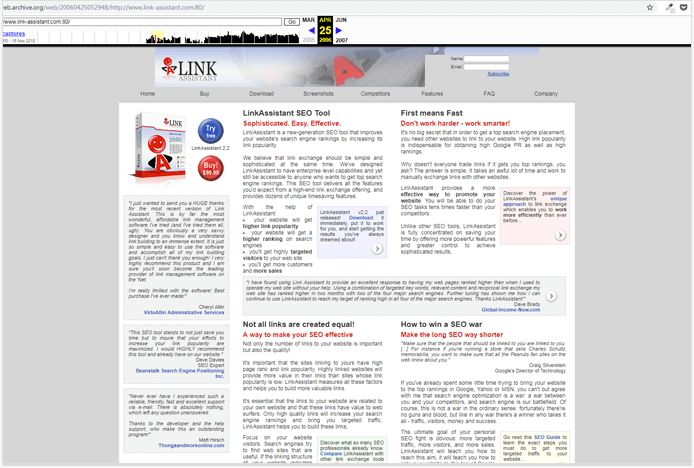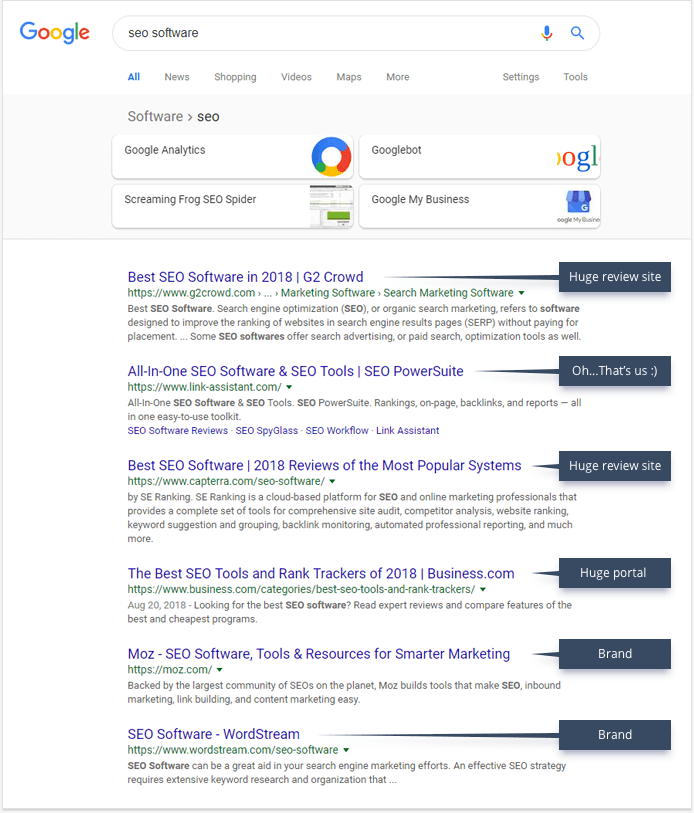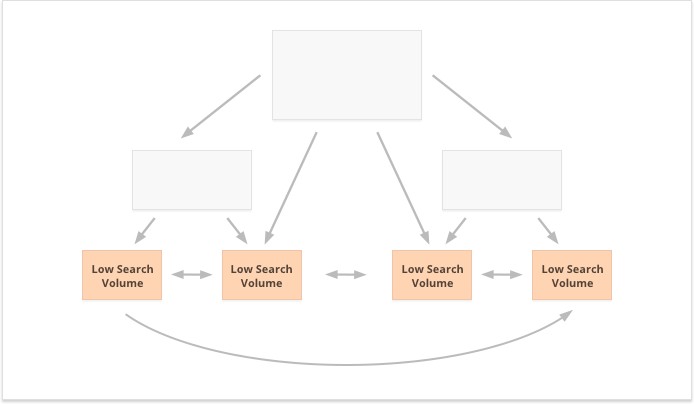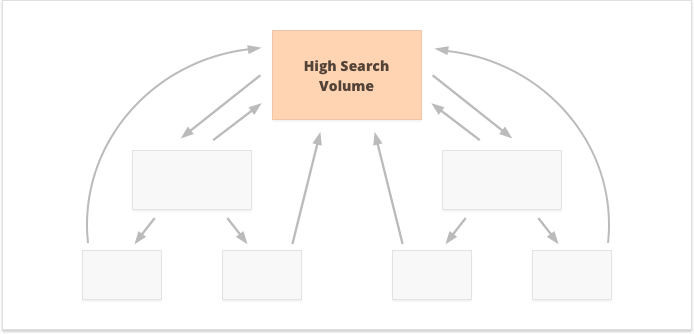•
6-minute read


Affiliate marketing is one of the most popular ways to monetize your website. It allows much more control over your monetization than you would get with some random AdSense banner. Plus, with affiliate marketing you can focus on the niche you're most passionate about as well as promote the products you truly believe in.
And since affiliate marketing success heavily depends on SEO, today we'll look into blending SEO and affiliate marketing strategies in the most efficient way.
Companies that sell their products online often look to partner with bloggers in their niche. Bloggers who work with such companies are called affiliates. Basically, an affiliate blogger helps a company to promote its product and gets a commission for every referred client.
Let's take our own SEO PowerSuite affiliate program as an example. If you become our affiliate partner, we give you a unique affiliate link to place on your website. And when someone clicks on your link and purchases our software you get a 33% affiliate commission.
In most cases, it's up to you how to promote your partner's product. You can recommend the product to your existing audience via email, blog posts, or social media posts. Alternatively, you can attract new audiences on behalf of your partner, like build a dedicated website and bring SEO and PPC traffic to it, organize training courses, launch promotional sales, etc. But the idea always remains the same: affiliate marketers refer new clients to a partner's website and get paid for that.
You might have heard that Google frowns upon affiliate websites. And there is some truth to it — Google does penalize affiliate websites often. Although it is not because of their affiliate nature. The actual reason is that affiliate websites are often created with very little effort.
Or, as Google's John Mueller puts it in a Google Webmaster Hangouts session,
Of course affiliate sites can have a lot of really useful information on them and we like showing them in search. But, at the same time, we see a lot of affiliates who basically just copy and paste the feeds that they get and publish them on their website. It's not something where we say that an affiliate site is bad, we just see a lot of bad affiliate sites. And if you have affiliate links on a website, that's not going to be something that we would count against a website.
So, the truth is — participating in an affiliate program can by no means hurt your SEO rankings. And when treating SEO seriously, you can turn organic traffic into a key source of your affiliate earnings.
A good place to start is a topic that you are passionate about. Especially if you are already a part of a community or even have a following in this niche.
However, there are three steps I recommend following before you settle into a specific niche and product.
Say, you are running an SEO blog and so the most obvious niche for your affiliate efforts is SEO software and services. But the topic of SEO is huge and you are unlikely to be able to cover all of it with high-quality content. And even if you do, you will become just another generic SEO blogger.
Instead, why not focus on a smaller part of SEO and establish a reputation as an expert in this specific area? You can do SEO tool reviews, run a/b tests, collect case studies, or build backlinks, among many other things. Over time, your blog will become the place to go to learn about this particular area of SEO.
In fact, some of the most well-known SEO bloggers have done just that. For example, you probably know Bill Slawski as the guy who writes about Google patents or Marie Haynes as an expert o the topic of E-A-T.
It's not enough for the topic to be interesting to you, it has to be interesting to other people as well. One way to check if the topic is interesting to other people is to see if they google it and how often. Or, in other words, see if the keywords related to your topic have substantial search volume.
There are plenty of ways to check keyword search volume, but we will use our own tool to give you an example. So, in Rank Tracker, go to the Keyword Research tab and use available research methods to discover as many keywords related to your topic as possible.
When done with keyword research, switch to the Keyword Sandbox tab, which is where we keep all of the discovered keywords. At the very top, you will see the total number of searches for all discovered keywords, as well as the amount of traffic you'd get if you were to rank in a top position for all of them.
You can also group discovered keywords by semantic similarity, effectively creating subtopics within your niche. This way you will see which subtopics are more popular than others.
Some of your keywords are probably already targeted by very powerful websites. So, hard as you try, you won't be able to rank in good enough positions to attract visitors. To check which keywords are too competitive, go to the Keyword Sandbox in Rank Tracker and check Keyword Difficulty for all discovered keywords as a group or for each individual keyword:
Now that you know the stats of your potential topics, it's time to select the ones to work with. The idea is to find the topics that are low in competition, but still high in search volume.
This step fits in if you're planning to build your affiliate website from scratch. Here are a few SEO considerations you might want to take into account.
Exact match domain names used to be extremely popular over a decade ago, when they were a huge ranking factor. Today, having keywords in your domain name is largely irrelevant. When ranking your website in search, Google looks at your content and not your domain name. So there is really no need to obsess over exact match domains or pay huge sums of money just to purchase a highly optimized domain name.
…just because keywords are in a domain name doesn't mean that it'll automatically rank for those keywords. And that's something that's been the case for a really, really long time.
In most cases, affiliate program rules clearly state that using their brands in your domain name is strictly prohibited. So beware of purchasing a branded domain (unless you have explicit permission from the company) not to face a lawsuit for infringing on a brand name.
When acquiring a website, it's very important to check its history. Because you don't want a domain that spammed Google with bad content or bad links in the past. But also in the hopes of discovering a healthy backlink profile, which would be an advantage in terms of authority.
The first place I would check is archive.org. It's a website that logs past versions of the pages from all over the web. Enter a few key pages from your website and see what they looked like in the past. Look for obvious signs of spammy content.
Psst, look what I've found! One of the first versions of this website back in 2006. Remember the times? I was actually a student back then :)

Another thing you should definitely check is backlink history and overall backlink profile. For that, create a project in SEO SpyGlass and enter your website. To give you an example of how it works, I've run a sample check on a website currently available for sale for $15,000. Incredibly, the website has over 800K backlinks, almost all of which are dofollow:
And, if we switch to the penalty risk tab, we can see that the profile is quite healthy with most linking domains posing no penalty risk:
Of course, it's worth running some manual checks as well, like visiting linking pages and checking for obvious signs of spam. But, from the automatic check, it looks like the website is well worth the money.
Once you are ready to start creating content, it's time to decide on the exact keywords you should pursue. And since today we're talking affiliate marketing, I have to switch your attention from big SEO keywords to searching for little "low hanging fruits".
Why is that? Because the biggest SEO keywords are already occupied by the brands you will be affiliated with. And I can guarantee they have more knowledge and resources than you to win that rankings battle.

So, what you would want to use instead are long-tailed keywords. Long-tailed keywords are longer, more specific search phrases with lower search volumes. These keywords are not attractive enough to be used by big brands, it's just too much effort for too little gain. But, for a small affiliate website, long-tailed keywords are a perfect opportunity to start ranking in search.
To find long-tailed keywords, go back to your Rank Tracker project, switch to the Keyword Sandbox tab, and click on the filter icon above the table of discovered keywords. In the pop-up window, set keyword length to three words or more. Additionally, you may want to set the parameters for keyword difficulty and search volume:
Once you click ok your initial list of keywords will be filtered to include only the keywords with matching parameters. All you have to do is scroll through the list and pick those keywords that you think will work for your content.
New to keyword research? Check out our latest video for beginner-friendly tips and tools.
When targeting many individual low-volume keywords (the "low hanging fruits" we've picked in the previous step), you will most probably end up creating quite a few separate pages for them. When your website is so fragmented, it is especially important to create architecture that supports the flow of traffic and the flow of link authority.
In this case, your site structure should follow a top-to-bottom approach, where your homepage and your category pages are directed towards individual blog posts, because this is where the conversion happens:

As opposed to websites where conversion happens on the home page. In which case you'd be catching traffic with individual blog posts and using internal links to direct users to your homepage:

Also, make sure that the internal links you set use keywords in their anchors. This, as John Mueller says, will help your visitors, as well as Google, understand what the linked pages are about:
If you're updating anchor text internally to make it more easily understandable by users then usually that also helps search engines to better understand the context of those pages. So I would definitely go for that.
And if you'd like to better understand what your current website structure looks like, just fire up the WebSite Auditor tool. In your project, go to Site Structure > Visualization and see how your pages are interlinked with each other. The tool will help you discover orphan pages as well as see if there is a logical flow to your overall structure.
For Google, your affiliate links are a means of earning affiliate commission (or, in other words, yet another type of a paid link). And since paid links are far from being a natural authority signal, Google would like to remove those links from calculating link authority. This is why one of the basic requirements for you is to add the nofollow tag to all affiliate links.
It's likely that Google is able to automatically identify some affiliate links built via popular affiliate networks (like Amazon) and "nofollow" them automatically. However, you'd better use a nofollow tag in case you're on a less popular network.
We handle the vast majority of affiliate stuff correctly because if it is a large enough affiliate network we know about it and we handle it on our side. Even though we handle the vast majority of affiliate links appropriately, if you are at all worried about it, I would go ahead and just add the nofollow because you might be earning money from that.
To make sure that all of your affiliate links are nofollowed, switch to the WebSite Auditor's Site Audit dashboard and check the list of your Dofollow external links:
Having too little content on your website or re-using the vendor's product descriptions and landing pages is likely to bury your SEO efforts under a Google penalty. Yet producing enough content might be an overwhelming task that you, as a small business, simply have no resources for.
A solution? Here is our beloved affiliate marketing tip. Try delegating some content creation to your users. Blog commenting, writing product reviews, testimonials, or any other option for users to express themselves on your website can charge your SEO campaign with additional content.
Furthermore, enabling user ratings lets you earn those nice-looking stars in your search engine snippet. Which, no doubt, makes you stand out in a crowded SERP and create the image of a successful digital marketing company.

Black Fridays, Cyber Mondays, Christmas, Easter, and whatnot. For most of these holidays, vendors tend to launch special time-limited deals and discounts.
For you, as an affiliate marketer, it means easy commission to grab, since, obviously, these special deals see doubled and tripled conversion rates. For instance, for SEO PowerSuite affiliates, these events mean three times the income of what they get on average.
So, by no means neglect to ask the vendor about the upcoming deals and prepare your digital marketing campaigns accordingly.
Since this article is geared towards affiliate marketing rather than SEO specifically, here is a list of material on various aspects of SEO you should take into account when building an affiliate website:
Did the article sound a bit like I was promoting our affiliate program? Well, if only a little. We'd really love to see you among our affiliates and help the world learn about SEO PowerSuite.
You can read about all the affiliate program conditions here, but I recommend getting in touch with Yana Kalashnikova, our Partnerships Manager, who will help you get on board (and who's simply a pleasure to chat with):
